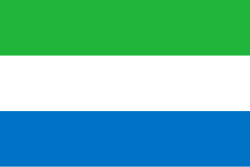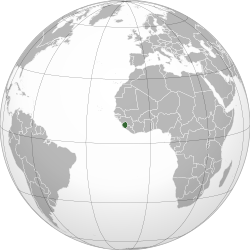
Back Сиерра-Леоне Abkhazian Sierra Leone ACE Sierra Leone Afrikaans Sierra Leone ALS ሴየራ ሌዎን Amharic Sierra leone AMI Sierra Leone AN Sierra Leone ANG Siera Leyon ANN सिएरा लोन ANP
Republic of Sierra Leone Ripɔblik fɔ Siera Liɔn (Krio) | |
|---|---|
| Motto: "Unity, Freedom, Justice" | |
| Anthem: "High We Exalt Thee, Realm of the Free" | |
| Capital and largest city | Freetown 08°30′00″N 12°06′00″W / 8.50000°N 12.10000°W |
| Official languages | English[1] |
| Recognised national languages | Krio[citation needed] |
| Ethnic groups (2015[3]) | |
| Religion (2020)[4] |
|
| Demonym(s) | Sierra Leonean |
| Government | Unitary presidential republic |
| Julius Maada Bio | |
| Mohamed Juldeh Jalloh | |
| David Sengeh | |
| Abass Chernor Bundu | |
| Legislature | Parliament |
| Independence from the United Kingdom | |
| 1 January 1808 31 August 1896 | |
• Dominion | 27 April 1961 |
• Republic | 19 April 1971 |
| Area | |
• Total | 73,252 km2 (28,283 sq mi) (117th) |
• Water (%) | 1.1 |
| Population | |
• 2023 estimate | 8,908,040[5] (100th) |
• Density | 124/km2 (321.2/sq mi) (114tha) |
| GDP (PPP) | 2024 estimate |
• Total | |
• Per capita | |
| GDP (nominal) | 2024 estimate |
• Total | |
• Per capita | |
| Gini (2024) | 33.7[7] medium inequality |
| HDI (2024) | low (184th) |
| Currency | Leone (SLE) |
| Time zone | UTC (GMT) |
| Calling code | +232 |
| ISO 3166 code | SL |
| Internet TLD | .sl |
| |
Sierra Leone,[a] officially the Republic of Sierra Leone, is a country on the southwest coast of West Africa. It is bordered to the southeast by Liberia and by Guinea to the north. Sierra Leone's land area is 73,252 km2 (28,283 sq mi).[12] It has a tropical climate and environments ranging from savannas to rainforests. As of the 2023 census, Sierra Leone has a population of 8,908,040.[3] Freetown is its capital and largest city.
Sierra Leone is a presidential republic, with a unicameral parliament and a directly elected president. It is a secular state. Its constitution provides for the separation of state and religion and freedom of conscience.[13] Muslims constitute three-quarters of the population, and there is a significant Christian minority. Notably, religious tolerance is very high.[14]
Sierra Leone's current territorial configuration was established in two phases: in 1808, the coastal Sierra Leone Colony was founded as a place to resettle returning Africans after the abolition of the slave trade; then in 1896, the inland Protectorate was created as a result of the Berlin Conference of 1884–1885. This led to the formal recognition of the territory as the Sierra Leone Colony and Protectorate.[15][16] Sierra Leone attained independence from the United Kingdom in 1961 under the leadership of Prime Minister Sir Milton Margai of the Sierra Leone People's Party (SLPP).[17] In 1971, under Prime Minister Siaka Stevens of the All People's Congress (APC), the country adopted a new constitution, transforming Sierra Leone into a presidential republic, with Stevens as the inaugural president. In 1978, Stevens declared the APC to be the sole legally recognized party. In 1985, he was succeeded by Joseph Saidu Momoh. Momoh's enactment of a new constitution in 1991 reintroduced a multi-party system. That same year, a protracted civil war broke out between the government and the Revolutionary United Front (RUF) rebel group. The conflict, characterized by multiple coups d'état, persisted for 11 years. Intervention by ECOMOG forces and later by the United Kingdom resulted in the defeat of the RUF in 2002, ushering in a period of relative stability.
Sierra Leone is a culturally diverse country, home to approximately 18 ethnic groups, with the Temne and Mende peoples being predominant. The Creole people, descendants of freed African-American, Afro-Caribbean slaves and liberated Africans, constitute about 1.2% of the population. English is the official language, while Krio is the lingua franca, spoken by 97% of the population. The country is rich with natural resources, notably diamonds, gold, bauxite and aluminium. As of the most recent survey in 2019, 59.2% of the population is affected by multidimensional poverty and an additional 21.3% vulnerable to it.[18] Sierra Leone maintains membership in several international organizations, including the United Nations, African Union, Economic Community of West African States (ECOWAS), and the Commonwealth of Nations, among others.
- ^ "Sierra Leone: Spread the Love". Embassy of the Republic of Sierra Leone in The Federal Republic of Germany. Archived from the original on 14 June 2024.
- ^ Lewis, M. Paul; Simons, Gary F.; Fennig, Charles D., eds. (2015). "Liberia". Ethnologue (18th ed.). Dallas, Texas: SIL International.
- ^ a b "Sierra Leone 2015 Population and Housing Census National Analytical Report" (PDF). Statistics Sierra Leone. Retrieved 28 March 2020.
- ^ Cite error: The named reference
religionswas invoked but never defined (see the help page). - ^ "Sierra Leone". The World Factbook (2025 ed.). Central Intelligence Agency. Retrieved 22 June 2023. (Archived 2023 edition.)
- ^ a b c d "World Economic Outlook Database, October 2023 Edition. (SL)". IMF.org. International Monetary Fund. 10 October 2023. Retrieved 21 October 2023.
- ^ "GINI index (World Bank estimate) – Sierra Leone". World Bank. Retrieved 22 March 2020.
- ^ "Human Development Report 2023-24" (PDF). United Nations Development Programme. United Nations Development Programme. 13 March 2024. pp. 274–277.
- ^ Wells, John C. (2008), Longman Pronunciation Dictionary (3rd ed.), Longman, ISBN 9781405881180
- ^ "Sierra Leone". Merriam-Webster.com Dictionary. Merriam-Webster. Retrieved 22 April 2019.
- ^ Salone Definition
- ^ "Sierra Leone (country)". Encarta Encyclopedia. Archived from the original on 28 February 2008. Retrieved 19 February 2008.
- ^ "Sierra Leone". United States Department of State. Retrieved 6 March 2024.
- ^ United Nations (5 July 2013), "Inter-religious cooperation can be vital asset for rebuilding Sierra Leone – UN expert". Archived. Retrieved October 26, 2021.
- ^ Hargreaves, J. D. (January 1956). "IV. The Establishment of the Sierra Leone Protectorate and the Insurrection of 1898". Cambridge Historical Journal. 12 (1): 56–80. doi:10.1017/S1474691300000330. ISSN 2051-9818.
- ^ UNITED NATIONS INTEGRATED PEACEBUILDING OFFICE IN SIERRA LEONE. ABOUT SIERRA LEONE: HISTORY. Archived. Retrieved October 26, 2021.
- ^ Fisher, Humphrey J. (December 1969). "Elections and Coups in Sierra Leone, 1967". The Journal of Modern African Studies. 7 (4): 611–636. doi:10.1017/S0022278X00018863. ISSN 1469-7777.
- ^ "Multidimensional Poverty Index 2023 Sierra Leone" (PDF). United Nations Development Programme Human Development Reports. 2023. Retrieved 26 July 2024.
Cite error: There are <ref group=lower-alpha> tags or {{efn}} templates on this page, but the references will not show without a {{reflist|group=lower-alpha}} template or {{notelist}} template (see the help page).
© MMXXIII Rich X Search. We shall prevail. All rights reserved. Rich X Search



